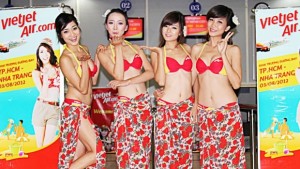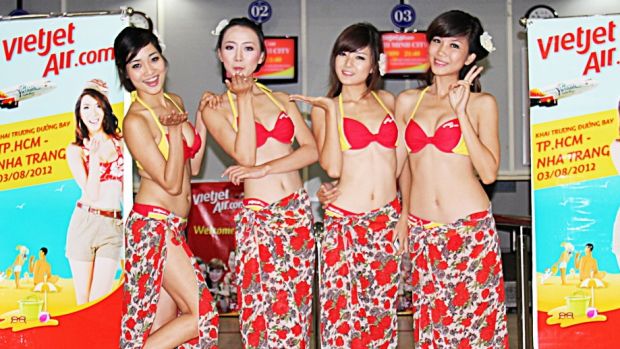
VietJet is known for its young and attractive flight attendants who wear bikinis on inaugural flights to beach locations.
Vietnamese Nguyen Thi Phuong Thao made her first million at 21 trading fax machines and latex rubber. Almost a quarter of a century later, she’s poised to become South-East Asia’s first self-made woman billionaire known for putting bikini-clad models on her VietJet Aviation Joint Stock planes and calendars.
With the initial public offering of Vietnam’s only privately-owned airline, Thao is set to have a net worth exceeding $US1 billion, according to the Bloomberg Billionaires Index, making her the country’s first female billionaire. The majority of her wealth is derived from her stake in VietJet and her holdings in Dragon City, a 65-hectare real estate development in Ho Chi Minh City.
“I’ve never sat down and calculated my assets,” Thao, 45, said in an interview. “I’m just focused on how to boost the company’s growth, how to increase the average salary for my employees, how to lead the airline to gain more market share and make it No.1.”
Thao said she’s planning for VietJet to hold its IPO as early as within the next three months, where it may sell as much as a 30 per cent stake. The carrier is aiming to seek a valuation of more than $US1 billion, according to two people with knowledge of the plan, who asked not to be named because the information is private. Thao, who founded the airline, owns 95 per cent of the company, according to two people familiar with the shareholding structure.
“She’s not like other wealthy people – she’s quite quiet in Vietnam actually,” said Vo Phuc Nguyen, a Ho Chi Minh City-based analyst at CIMB Group Holdings. “She’s really successful with VietJet. From nothing, that airline now accounts for more than 30 per cent of market share in Vietnam in just over the last few years.”
Swamp land
The billionaire also owns a 90 per cent stake in Sovico Holdings, a closely-held company that has a 90 per cent stake in Dragon City, according to the people, who asked not to be named because the information isn’t public. She bought the site more than a decade ago in what was a swampy area in Vietnam’s economic hub, and the valuation is calculated using the equity-to-debt ratio of the project’s $US1 billion investment value.
Thao also has majority stakes in three resorts in Vietnam – the Furama Resort Danang, the Evason Ana Mandara Nha Trang and the An Lam Ninh Van Bay Villas, the people said. The properties are valued using current income, and occupancy and prevailing capitalisation rates from real estate consultant Cushman & Wakefield.
Thao and her holding company also own about a 20 per cent stake in Ho Chi Minh City Development JS Commercial Bank, or HDBank, according to the people. Thao’s the vice-chairman of the privately-held commercial bank, which has total assets of about $US4.6 billion last year. The company has 225 branches and employs almost 10,000 people.
Thao’s foray into business began around 1988 as a second- year student in Moscow, where she was studying finance and economics. She began as a trade distributor with little money, receiving clothing, office equipment and consumer goods on credit from suppliers in Japan, Hong Kong and South Korea, and selling them in Russia in the years before collapse of the Soviet Union.
‘Being honest’
“I worked so hard and earned the trust of suppliers by always being honest with them,” said Thao, whose mother was a teacher and father, a pharmacist. “I didn’t have much money. They gave me more and more products with longer credit terms.”
After making her first million three years later, Thao moved on to trade steel, machinery, fertiliser and other commodities.
She returned to Vietnam and invested in Techcombank, also known as Vietnam Technological and Commercial Joint-Stock Bank, and a second lender, Vietnam International Commercial Joint Stock Bank. She later lodged an application to run an airline in anticipation the communist government, which adopted a market economy in 1986, would open up the industry to compete against state carrier Vietnam Airlines.
‘Bikini image’
VietJet is known for its young and attractive flight attendants who wear bikinis on inaugural flights to beach locations and featured similar models on its calendars, which Thao says are empowering images in Vietnam’s conservative culture.
“You have the right to wear anything you like, either the bikini or the traditional ao dai,” she said, referring to the traditional long tunic worn over loose pants. “We don’t mind people associating the airline with the bikini image. If that makes people happy, then we are happy.”
Thao wants to make VietJet the “Emirates of Asia”, modelling after the success of the Dubai-based carrier that’s the world’s biggest long-haul airline with flights to about 150 destinations. The Vietnamese budget carrier, which began operations in 2011, flies to 47 locations in the country and across Asia, and the valuation it’s seeking will make it more valuable than South Korea’s Asiana Airlines or Finnair Oyj.
“You have to take the lead and take calculated risks,” she said. “As a businesswoman, I have a responsibility to contribute to the economy and to push for positive changes of the country and in the society, in light of the international integration that’s happening.”
Source: http://www.smh.com.au/business/world-business/how-bikini-airline-helped-create-vietnams-first-female-billionaire-20160324-gnq3lt.html


